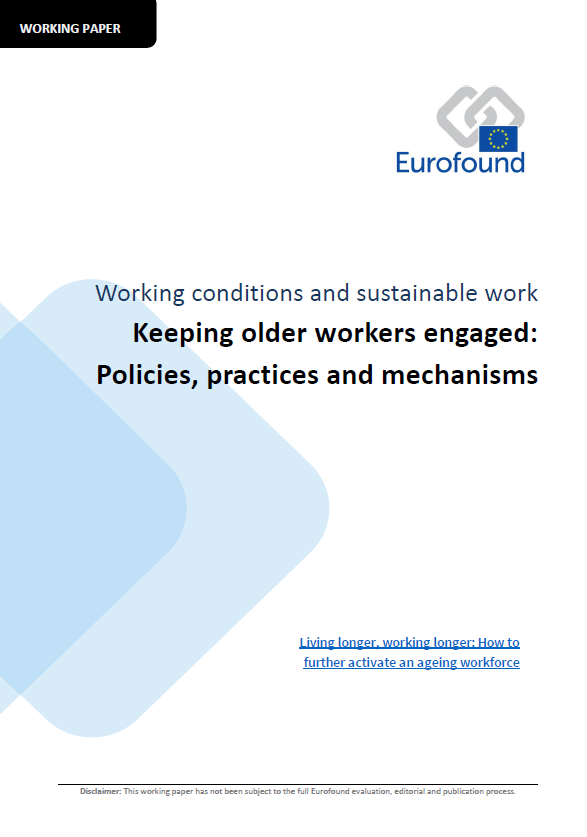EU context
Az idősebb munkavállalók foglalkoztatási arányának múlt évtizedbeli, több tagállamot érintő jelentős növekedése ellenére az Európai Bizottság 2017. évi közös foglalkoztatási jelentése kiemelten foglalkozik ennek az aránynak a további emelésével. 2016-ban az Európai Unióban az 55–64 éves korosztályhoz tartozó idősebb munkavállalók foglalkoztatási aránya 55,3% volt, miközben a teljes 15–64 éves korosztálynál ez a mutató 66,6% volt. A növekedés az idősebb nőknél volt a legnagyobb mértékű.
A szociális jogok európai pillére keretet biztosít a munkaerőpiacok új kihívásokhoz való alkalmazkodásának támogatásához, és közben előmozdítja a generációk közötti tisztességességet és szolidaritást. Hangsúlyozza, hogy a munkavállalóknak joguk van olyan munkakörnyezethez, amely megfelel szakmai szükségleteiknek, és amely lehetővé teszi, hogy huzamos ideig jelen legyenek a munkaerőpiacon. Ezen túlmenően az európai szociális partnerek tevékeny időskorról és generációkon átívelő szemléletmódról szóló új, önálló megállapodása megkönnyíti az idősebb munkavállalók részére a munkaerőpiacon való tevékeny részvételt és azt, hogy hosszabb ideig dolgozzanak.
Az Eurofound munkája
Az Eurofound hosszú múltra visszatekintő tapasztalattal rendelkezik az idősödő munkaerő előtt álló problémák területén. A kutatás az 1990-es évek óta összpontosít az idősebb munkavállalók munkaerőpiaci részvételére, munkavégzésére, munkakörülményeire és munkára vonatkozó preferenciáira Európa változó demográfiai profiljának szakpolitikai összefüggésében. A munka összpontosított továbbá az idősebb munkavállalók foglalkoztatását előmozdító állami támogatásra és vállalati szintű kezdeményezésekre. Kutatta az idősebb női munkavállalók helyzetét, kiemelve az e csoportra jellemző növekvő foglalkoztatási rátát és a munkaerőben megjelenő növekvő arányukat, különösen az 55–64 éves korosztály tekintetében.
A felmérések adatai
Az Eurofound fő felmérései számos adatot biztosítanak az idősebb munkavállalók helyzetéről. A hatodik európai munkakörülmény-felmérés (EWCS) azt vizsgálja, hogy az idősebb munkavállalók helyzete milyen a munka minőségének különböző dimenzióiban. Bár az idősebb munkavállalók a fiatalabbaknál ritkábban válnak munkanélkülivé, az adatok azt mutatják, hogy az idősebb munkavállalók úgy érzik, hogy ha munkanélkülivé válnak, nem találnak hasonló fizetés mellett új munkát, és még nehezebb lesz számukra a munkaerőpiacra való visszatérés.
Az Eurofound ötödik európai munkakörülmény-felméréséről (EWCS) szóló tanulmány az idősebb munkaerő és a különböző korban végzett munka jellemzőit vizsgálja, valamint azokat a tényezőket, amelyek fenntarthatóvá teszik a munkát az idősödő munkaerő számára: jó munkakörülmények, lelki és mentális jóllét, valamint a munka és a magánélet közötti egyensúly.
Az Eurofound európai életminőség-felmérése (EQLS) korral összefüggő megállapításokat tartalmaz az európai életminőség különböző dimenziói tekintetében. Az 50 év felettiek munkára vonatkozó preferenciáinak elemzése a harmadik európai életminőség-felmérés adataira alapoz, és rámutat, hogy sok idősebb munkavállaló akkor is a rövidebb munkaidőt részesíti előnyben, ha figyelembe veszi pénzügyi szükségleteit. A munkaidő ilyen, preferenciákkal való közelebbi összevetésének ösztönzése lehetővé teheti a munka világában való hosszabb ideig tartó részvételt és motivációt biztosíthat ehhez.
A munka világában való hosszabb részvétel
Az Eurofound mostanában összefogott három másik uniós ügynökséggel a minden életkornak megfelelő európai munka, az idősödő munkaerőhöz kapcsolódó szakpolitikai kihívások és az innovatív megoldások kutatásában.
Sokan nem tudnak a törvényes nyugdíjkorhatár eléréséig dolgozni, vagy nem éreznek erre késztetést. Van azonban egy csoport, amely képes is és akar is e határt meghaladva dolgozni. Az Eurofound megvizsgálta a nyugdíjba vonulás utáni munkakezdés egyre elterjedtebb jelenségét.
A legfrissebb kutatások a munkavégzés rugalmas nyugdíjrendszerekkel való meghosszabbítására, különösen az ennek ösztönzésére alkalmas részlegesnyugdíj-rendszerekre összpontosítottak. A karrier közepére időzített felülvizsgálatok ugyancsak hozzájárulnak a munka világában való részvétel meghosszabbításához. A kutatás azt is megvizsgálta, hogy azok hogyan segíthetnek tisztázni a munkavállalók számára a későbbi nyugdíjkorhatárig való munkavállalási lehetőségeket. A vállalatok által kialakított, az idősödő munkaerő megtartására irányuló különböző eszközökre hívja fel a figyelmet.
Más kutatási dokumentumok kiemelik a kormányzatok és szociális partnerek nemzeti és ágazati kezdeményezéseit az idősebb munkavállalók munkaerőpiacon való megtartása érdekében, ideértve a pénzügyi ösztönzőket és a kedvezőbbé tett körülményeket. Egy korábbi projektben a recessziót megelőzően és azt követően bevezetett, korral kapcsolatos kezdeményezéseket elemeztek az európai vállalatok helyes gyakorlatainak kiemelése érdekében.
Források
















